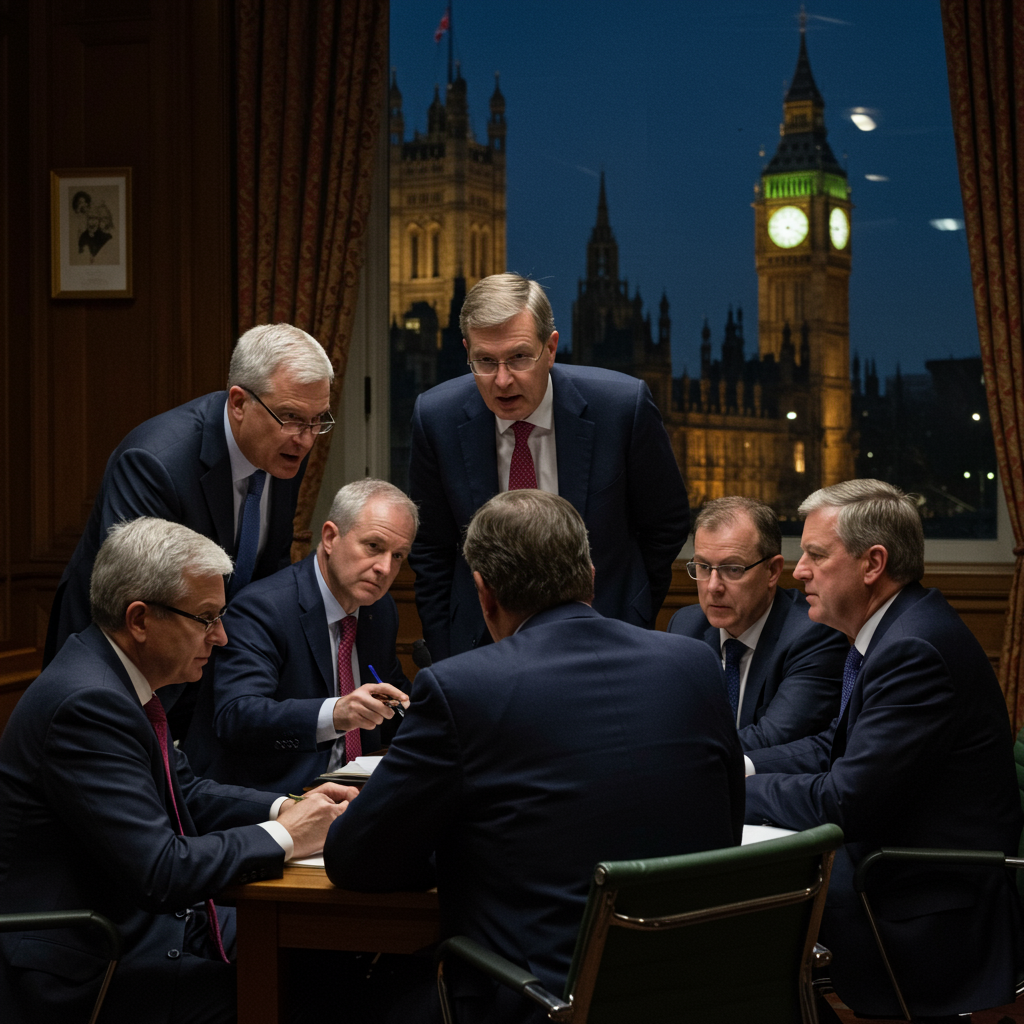In a dramatic late-night development, the UK government has significantly altered controversial welfare reform plans, opting to delay key changes to the Personal Independence Payment (PIP) scheme. This move came just hours before a critical vote in the House of Commons on the Universal Credit and Personal Independence Payment Bill. The concessions were seen as essential to secure the bill’s passage amidst a looming rebellion from within the government’s own ranks, highlighting deep divisions over the future of disability benefits and welfare policy.
The decision to postpone the proposed PIP reforms represents a major shift from the government’s original intentions, which aimed to introduce stricter eligibility criteria for new claimants. This follows earlier concessions made in the preceding week, which guaranteed that existing PIP recipients would not see their benefits reduced under the new rules. The latest delay means that stricter assessment standards for new applicants are now on hold until a comprehensive review of the PIP assessment process is completed. This review, led by Minister Sir Stephen Timms, is currently underway and is anticipated to conclude by Autumn 2026.
A Pivotal Vote and Unexpected Climbdowns
The passage of the government’s welfare bill through its second reading in the House of Commons proved to be a tumultuous affair. While the government ultimately won the vote, the path to victory required not one, but two substantial concessions. The most recent, announced during the debate itself, specifically addressed planned changes to how PIP eligibility is assessed. Originally, the bill included measures that would require new claimants to score a minimum number of points within a single assessment category to qualify for support. This was highly contentious.
Facing the prospect of a significant number of its own MPs voting against the legislation, the government agreed to remove this specific clause (Clause 5) from the bill at the committee stage. Ministers confirmed that any changes to PIP eligibility activities or descriptors will now be contingent on the outcome of the Timms review. Sir Stephen Timms himself stated during the debate that the review’s purpose is to “get the assessment right,” pushing back against concerns that it was purely a cost-saving exercise. This eleventh-hour change aimed to placate dissenting voices who felt the original reforms were rushed and failed to adequately consider the impact on disabled people.
Financial Fallout: Savings Evaporate
The concessions made to pass the welfare bill have significant ramifications for the public finances. The original reform package was projected by the Office for Budget Responsibility (OBR) to yield substantial savings, estimated at around £5 billion per year by the end of the decade (2029-30). The first concession, protecting existing PIP claimants, had already halved this projected saving to approximately £2.5 billion annually.
The latest decision to delay changes for new PIP claimants until after the review means that even these reduced savings are now highly uncertain. Fiscal experts anticipate that the OBR may not “score” these projected savings in upcoming forecasts, such as the Autumn Budget. The OBR typically requires policy details to be clear and confirmed before accounting for their financial impact. Consequently, public spending in 2029-30 could be assessed as around £5 billion higher than previously assumed, effectively cutting the Chancellor’s forecast fiscal headroom against borrowing rules significantly. Some reports suggest the concessions leave the government with virtually no net savings from the welfare bill by 2029-30 compared to the original targets. Ministers were reportedly unable to provide precise savings figures after the latest changes.
Political Turmoil and Party Divisions
The process of getting the bill through the House of Commons was widely described as “chaotic,” “shambolic,” and a “complete mess” by MPs across the political spectrum. The last-minute nature of the concessions, announced without immediate written detail, drew sharp criticism for being an “unacceptable way of making laws.” Some MPs confessed to being unsure exactly what they were voting on due to the rapid changes.
Politically, securing the bill’s second reading by 335 votes to 260 (a government majority of 75) came at a cost. The voting figures revealed a substantial level of internal dissent. An amendment aiming to block the bill entirely saw 49 Labour MPs vote against their party leadership, with reports indicating that over 120 MPs had threatened to rebel before the concessions were announced. While the concessions brought some potential rebels back on side, the final vote still represented the largest rebellion faced by the current leadership. Opposition parties seized on the disarray. The Shadow Work and Pensions Minister described the bill as having been “ripped apart” and left with “next to nothing in it” after the concessions. Conservative figures called it “utter capitulation” and deemed the legislation “pointless,” questioning the government’s ability to manage policy.
Stakeholder Reactions: Relief Mixed with Concern
Reactions from disability charities and advocacy groups were complex, reflecting a mix of cautious relief about the delayed PIP cuts but continued deep concern about the overall direction and handling of welfare reform.
While welcoming the delay in implementing the stricter PIP criteria for new claimants, many organizations highlighted ongoing worries. Sense, a charity for people with complex disabilities, described the outcome as “deeply distressing” and pointed to government data suggesting the original bill could push thousands into poverty. They noted that delaying cuts for new claimants while potentially maintaining different standards later could create an unfair “two-tier system.” Scope, a disability equality charity, reiterated that disabled households face significant extra costs and argued that the bill, even with changes, still reduces support, particularly for new Universal Credit health element claimants.
Other groups echoed calls for a complete rethink. Citizens Advice welcomed the concessions but urged the government to pause the entire bill and adopt a genuinely supportive approach. Amnesty International UK called the planned cuts “reckless.” The MS Society described the process as “panicked eleventh hour changes” that failed to fix a fundamentally flawed bill. Mencap, a charity for people with learning disabilities, expressed pleasure that the government had listened regarding the delay but stressed the vital need for disabled people to be included in co-producing any future reforms. Charities advocating for children in care also raised specific concerns about proposals to restrict the Universal Credit health element for young care leavers. The consensus among many groups is that while the immediate threat of certain PIP cuts has receded, the underlying concerns about the impact of welfare changes on vulnerable people remain.
What Remains of the Welfare Bill?
Despite the significant concessions on PIP eligibility, not all elements of the original welfare bill have been abandoned. Key proposals still contained within the legislation include:
Cuts to the Universal Credit Health Element: The bill still proposes reducing the Universal Credit health element by almost 50% for most new claimants starting from April 2026.
Protection for Severe Cases: An earlier concession guaranteed that existing recipients of the Universal Credit health element, as well as new claimants with the most severe conditions, would have their incomes fully protected in real terms.
Universal Credit Standard Allowance Increase: The bill also includes a commitment to an above-inflation increase in the Universal Credit standard allowance.
“Right to Try” Provisions: Work and Pensions Secretary Liz Kendall highlighted that the bill still contains “really important changes” aimed at tackling work disincentives and introducing measures intended to support people into employment, often referred to as the “right to try.”
The government maintains that the reforms are necessary to improve the welfare system and help more people into work. However, critics argue that the concessions have gutted the bill’s original purpose, particularly its fiscal aims, while still leaving in place measures that could negatively impact vulnerable individuals. The debate over the bill is far from over, with further stages expected to see continued scrutiny and potential challenges.
Frequently Asked Questions
What specific PIP changes did the UK government delay?
The UK government delayed planned changes to Personal Independence Payment (PIP) eligibility criteria, specifically a proposal that would require new claimants to score a minimum of four points in a single assessment category. This specific clause (Clause 5) is being removed from the bill. The delay means these stricter assessment rules will not be implemented for new applicants until after a planned review of the PIP assessment process is completed, currently anticipated by Autumn 2026.
Where can I find more information about the PIP assessment review?
The comprehensive review of the Personal Independence Payment (PIP) assessment process is being led by Minister Sir Stephen Timms. While specific public resources for the review itself were not immediately detailed alongside the concession announcement, updates and findings are expected to be published as the review progresses towards its anticipated conclusion in Autumn 2026. Government departmental websites, particularly the Department for Work and Pensions (DWP), and official parliamentary publications would be the primary sources for information once available.
How might the delayed PIP reforms affect future benefit claimants?
The delay means that future applicants for PIP will not face the stricter eligibility criteria (requiring four points in one assessment category) immediately. Instead, assessment rules will remain unchanged for new claimants until at least Autumn 2026, pending the outcome of the review. However, there is concern among some groups that the delay might simply postpone the implementation of cuts or lead to a “two-tier system” in the future, where new claimants face harder criteria than existing ones, depending on the review’s findings and subsequent policy decisions.
Looking Ahead: Uncertainty Remains
The passage of the welfare bill’s second reading, albeit requiring significant concessions and exposing internal party divisions, leaves many questions unanswered. The ultimate scope and financial impact of the reforms are now uncertain, pending the outcome of the PIP assessment review. The process has also highlighted the challenges inherent in reforming welfare systems, particularly measures affecting disabled people, and the need for careful consultation and consideration of potential impacts on vulnerable individuals. The debate over the bill will continue as it progresses through Parliament, ensuring that scrutiny of these vital policies remains in the spotlight.




